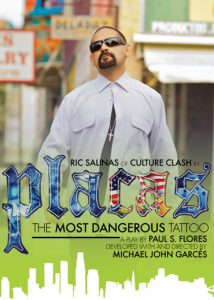Placas, The Most Dangerous Tattoo
 “The ego goes out the door. The subject matter is real. In terms of collaboration, you have to have no ego, or people will try to put their agenda [on it]”, says Rick Salinas of Culture Clash fame, during a Q&A after a performance of award-winning poet and writer, Paul Flores’ play Placas, The Most Dangerous Tattoo at UCSD. Then, he sat quietly listening to the other actors talk about their experiences since they became a part of a play based on interviews conducted by the playwright, and on the life of Alex Sanchez, a former gang member founder of the L.A. non-profit, Homies Unidos.
“The ego goes out the door. The subject matter is real. In terms of collaboration, you have to have no ego, or people will try to put their agenda [on it]”, says Rick Salinas of Culture Clash fame, during a Q&A after a performance of award-winning poet and writer, Paul Flores’ play Placas, The Most Dangerous Tattoo at UCSD. Then, he sat quietly listening to the other actors talk about their experiences since they became a part of a play based on interviews conducted by the playwright, and on the life of Alex Sanchez, a former gang member founder of the L.A. non-profit, Homies Unidos.
Salinas, who also happens to be Salvadorian by birth, plays Fausto Carbajal, a Salvadorian ex-gang member of MS13, who has made the most dangerous choice of his life, getting rid of his tattoos: the Placas. These tattoos have been his identity for a lifetime, his link to a specific gang, a specific lifestyle. When removed, they signify his betrayal to those that have been his “familia”, his gang. “There is no such thing as a former gang member,” says Fausto. We get the message, only dead ones.
Fausto is a flawed human being trying to do the right thing. He wants to change. He wants to give his family a better life.Doing so will mean living the rest of his life with an invisible target sign. “What is a number”, he asks. The audience finds out that it’s the one that defines you, the number in the name of your gang, on your body, on your soul.
But Placas is more than just a number and an affiliation. It’s a play about the life and suffering of a community, the Salvadorian diaspora that, although it survived a bloody civil war in its own country, has had to endure another type of violence. The birth of groups which initially protected the Salvadorian community from the existing gang violence of Los Angeles and San Francisco in the late seventy’s and eighties, became one of the most violent of all the gangs, trans-national gangs that have left their mark from El Salvador to the US, and beyond. But this play is not another documentary demonizing, nor glorifying this gang. Rather, it seeks to establish a dialogue with the community, reflecting its reality, and speaking its truth, whether we like it or not. Like Rick Salinas says: “I tell Paul that his play is so specific that it becomes universal because it’s a reality… you can’t deny it. It is the real thing…. Here you have professional actors, a play about El Salvador, by a guy, who’s not from that country; but based on real people, and the community is a part of it…I do a lot of plays, to get the community engaged like this, very rare.”
It is here where we see the universality of its theme. This is a play about love, the bond between parent and child. It is about the sacrifices that sometimes must be made for your child to be safe. Fausto’s decision to remove his tattoos is to protect his son Hector from following in his path. It doesn’t matter that it is court ordered; everyone who wants to leave that part of society must have them removed. It is a way to “become normal”, but that is not why Fausto does it. The pain he will endure has a reason: saving his son. And his son is quickly going down the same path he did. He believes, if he ends up in jail like his father, “the neighborhood will protect” his baby sister from harm. Not even the therapist, played brilliantly by Sarita Ocón, can reach him.
“We will piss someone off… for two hours you will hate me, it’s okay. But I’m here from a point of love doing it for you [the community]”, says Caro Zeller during the Q&A. A Boricua actress who plays Sparky, one of the best hard-shell-I-will-kill-for-my-kids-Chicana mothers ever written, and it’s not just her; all the characters are well developed and sharply portrayed. Luis “Xago” Juarez, a Chicano actor who plays two gang-leader veterans, surprised me because even though he’s much younger than the characters he plays on stage, he looks, and sounds much older. He brings a sincere passion to his words, “the movement is your raza, your family”, as he recruits young men, hungry for what’s missing, a family unit that will protect them.
One of these men is Hector, played by Javy Moreno, who grew up with an absent father who was jailed, deported, and, unbeknown to him, struggling to come back to him.
Will Fausto be able to succeed? Will removing his Placas save not only Fausto, but also his son? You have to watch the play to get that answer. Directed by Michael John Garcés, it premiers in San Diego at LINCOLN HIGH SCHOOL Performing Arts Center on April 23, 24, 25, 2015.


 Arturo Castañares
Arturo Castañares


